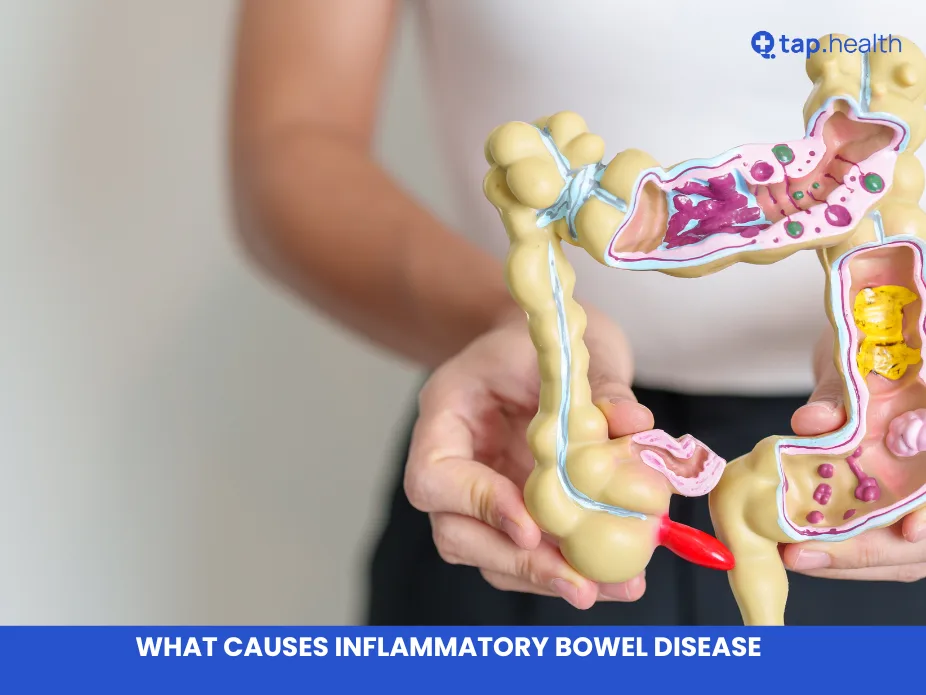Inflammatory Bowel Disease (IBD) refers to chronic inflammation of the digestive tract. The two main forms are Crohn’s disease and ulcerative colitis. Though the exact cause of IBD is still unknown, it arises from a complex interplay of genetics, immune system dysfunction, gut bacteria imbalance, and environmental triggers.
Is Genetics a Major Cause of IBD?
Yes. Family history is one of the strongest risk factors.
- Over 200 genes are linked to IBD; the NOD2 gene is the most studied.
- If a parent or sibling has IBD, your risk increases 10–20 times.
- However, genetics alone do not cause IBD – they make you susceptible.
How Does the Immune System Trigger IBD?
IBD is an autoimmune condition. The immune system mistakenly attacks harmless gut bacteria or food particles, treating them as threats. This ongoing attack causes chronic inflammation in the intestines. In genetically predisposed people, a viral or bacterial infection can start this faulty immune response.
Why Is Gut Microbiome Imbalance Linked to IBD?
Healthy guts contain trillions of beneficial bacteria (microbiota). In IBD patients, this balance (dysbiosis) is disrupted:
- Fewer protective bacteria
- More inflammation-causing bacteria Studies show that transferring healthy microbiota via fecal transplant can reduce symptoms in some ulcerative colitis cases.
Do Environmental Factors Cause IBD?
Strong evidence points to environment and lifestyle:
- IBD is more common in urban, industrialized areas
- Western diet high in processed food, sugar, emulsifiers, and low in fiber alters the microbiome
- Air pollution and early-life antibiotic use are emerging risk factors
- Appendectomy (removal of appendix) lowers ulcerative colitis risk, possibly because the appendix stores good bacteria
Does Smoking Really Affect IBD Risk?
Yes, dramatically:
- Smoking doubles the risk of Crohn’s disease and worsens its course
- Paradoxically, smokers have a slightly lower risk of ulcerative colitis, but quitting is still recommended
Can Diet Alone Cause IBD?
Diet does not directly cause IBD, but it is a major trigger and modulator: Foods that commonly worsen symptoms or inflammation:
- Processed meats, refined carbs, saturated fats, emulsifiers (found in ice cream, mayonnaise) Protective foods:
- High-fiber diet, fruits, vegetables, omega-3 fatty acids, turmeric, ginger, fermented foods
Can Stress Cause Inflammatory Bowel Disease?
Stress does not cause IBD, but it is a proven flare trigger. Chronic stress alters gut motility, immunity, and microbiome composition, making flare-ups more likely.
Who Is Most at Risk of Developing IBD?
Highest-risk groups:
- Age 15–35 (first peak) or over 60 (second peak)
- Ashkenazi Jewish descent
- Family history of IBD
- Living in developed countries
- History of smoking (for Crohn’s)
How Can You Lower Your Risk of IBD?
While you cannot change your genes, you can influence other factors:
- Eat a high-fiber, Mediterranean-style or plant-rich diet
- Avoid unnecessary antibiotics
- Quit smoking
- Manage stress through yoga, exercise, or therapy
- Prioritize good sleep (7–9 hours)
- Breastfeeding in infancy appears protective
Quick FAQ: What Causes IBD?
Q: Is IBD contagious?
A: No, you cannot catch IBD from others.
Q: Can infections cause IBD?
A: Infections can trigger the first flare in genetically susceptible people.
Q: Is IBD the same as IBS?
A: No. IBS is a functional disorder; IBD is an organic disease with visible inflammation and potential complications.
Q: Will avoiding gluten prevent IBD?
A: No evidence unless you have celiac disease.
Can TapHealth Help Manage Diabetes and IBD Together?
Many patients live with both IBD and diabetes. TapHealth’s remote monitoring, diet tracking, and specialist consults make it easier to control blood sugar while avoiding IBD food triggers. Book a consultation today and take charge of both conditions effectively.



